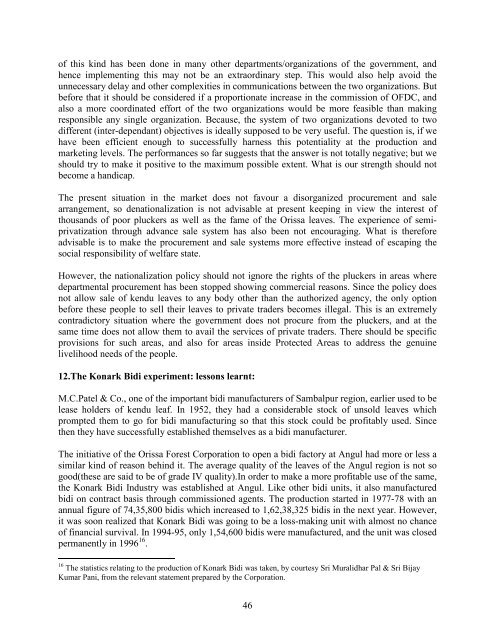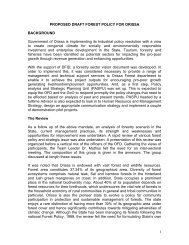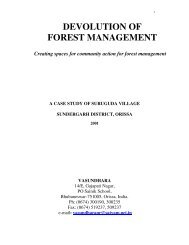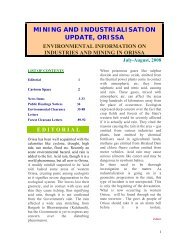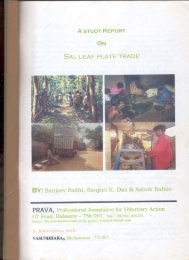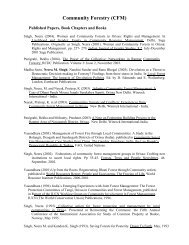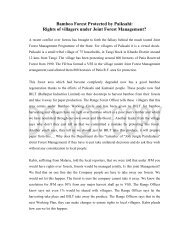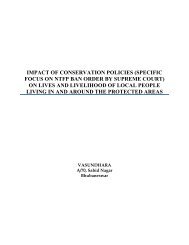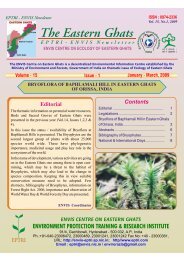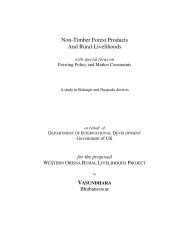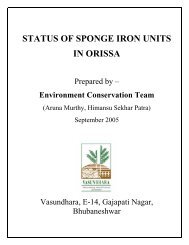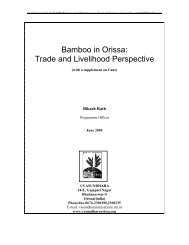The Kendu Leaf Trade: Problems & Prospects in Orissa - Vasundhara
The Kendu Leaf Trade: Problems & Prospects in Orissa - Vasundhara
The Kendu Leaf Trade: Problems & Prospects in Orissa - Vasundhara
You also want an ePaper? Increase the reach of your titles
YUMPU automatically turns print PDFs into web optimized ePapers that Google loves.
of this k<strong>in</strong>d has been done <strong>in</strong> many other departments/organizations of the government, and<br />
hence implement<strong>in</strong>g this may not be an extraord<strong>in</strong>ary step. This would also help avoid the<br />
unnecessary delay and other complexities <strong>in</strong> communications between the two organizations. But<br />
before that it should be considered if a proportionate <strong>in</strong>crease <strong>in</strong> the commission of OFDC, and<br />
also a more coord<strong>in</strong>ated effort of the two organizations would be more feasible than mak<strong>in</strong>g<br />
responsible any s<strong>in</strong>gle organization. Because, the system of two organizations devoted to two<br />
different (<strong>in</strong>ter-dependant) objectives is ideally supposed to be very useful. <strong>The</strong> question is, if we<br />
have been efficient enough to successfully harness this potentiality at the production and<br />
market<strong>in</strong>g levels. <strong>The</strong> performances so far suggests that the answer is not totally negative; but we<br />
should try to make it positive to the maximum possible extent. What is our strength should not<br />
become a handicap.<br />
<strong>The</strong> present situation <strong>in</strong> the market does not favour a disorganized procurement and sale<br />
arrangement, so denationalization is not advisable at present keep<strong>in</strong>g <strong>in</strong> view the <strong>in</strong>terest of<br />
thousands of poor pluckers as well as the fame of the <strong>Orissa</strong> leaves. <strong>The</strong> experience of semiprivatization<br />
through advance sale system has also been not encourag<strong>in</strong>g. What is therefore<br />
advisable is to make the procurement and sale systems more effective <strong>in</strong>stead of escap<strong>in</strong>g the<br />
social responsibility of welfare state.<br />
However, the nationalization policy should not ignore the rights of the pluckers <strong>in</strong> areas where<br />
departmental procurement has been stopped show<strong>in</strong>g commercial reasons. S<strong>in</strong>ce the policy does<br />
not allow sale of kendu leaves to any body other than the authorized agency, the only option<br />
before these people to sell their leaves to private traders becomes illegal. This is an extremely<br />
contradictory situation where the government does not procure from the pluckers, and at the<br />
same time does not allow them to avail the services of private traders. <strong>The</strong>re should be specific<br />
provisions for such areas, and also for areas <strong>in</strong>side Protected Areas to address the genu<strong>in</strong>e<br />
livelihood needs of the people.<br />
12.<strong>The</strong> Konark Bidi experiment: lessons learnt:<br />
M.C.Patel & Co., one of the important bidi manufacturers of Sambalpur region, earlier used to be<br />
lease holders of kendu leaf. In 1952, they had a considerable stock of unsold leaves which<br />
prompted them to go for bidi manufactur<strong>in</strong>g so that this stock could be profitably used. S<strong>in</strong>ce<br />
then they have successfully established themselves as a bidi manufacturer.<br />
<strong>The</strong> <strong>in</strong>itiative of the <strong>Orissa</strong> Forest Corporation to open a bidi factory at Angul had more or less a<br />
similar k<strong>in</strong>d of reason beh<strong>in</strong>d it. <strong>The</strong> average quality of the leaves of the Angul region is not so<br />
good(these are said to be of grade IV quality).In order to make a more profitable use of the same,<br />
the Konark Bidi Industry was established at Angul. Like other bidi units, it also manufactured<br />
bidi on contract basis through commissioned agents. <strong>The</strong> production started <strong>in</strong> 1977-78 with an<br />
annual figure of 74,35,800 bidis which <strong>in</strong>creased to 1,62,38,325 bidis <strong>in</strong> the next year. However,<br />
it was soon realized that Konark Bidi was go<strong>in</strong>g to be a loss-mak<strong>in</strong>g unit with almost no chance<br />
of f<strong>in</strong>ancial survival. In 1994-95, only 1,54,600 bidis were manufactured, and the unit was closed<br />
permanently <strong>in</strong> 1996 16 .<br />
16 <strong>The</strong> statistics relat<strong>in</strong>g to the production of Konark Bidi was taken, by courtesy Sri Muralidhar Pal & Sri Bijay<br />
Kumar Pani, from the relevant statement prepared by the Corporation.<br />
46


